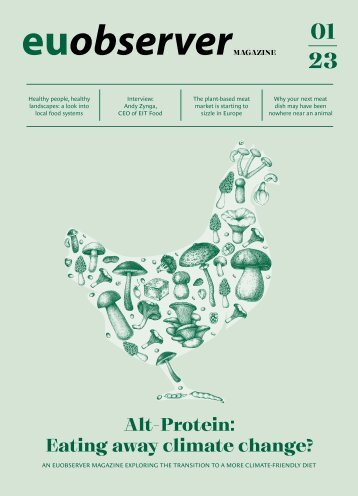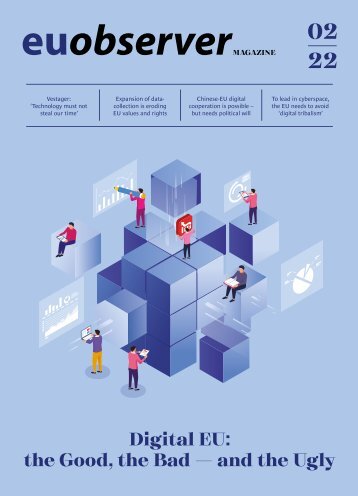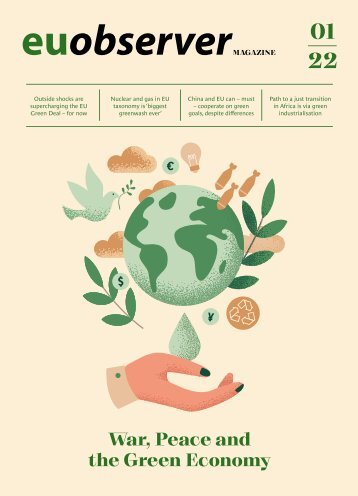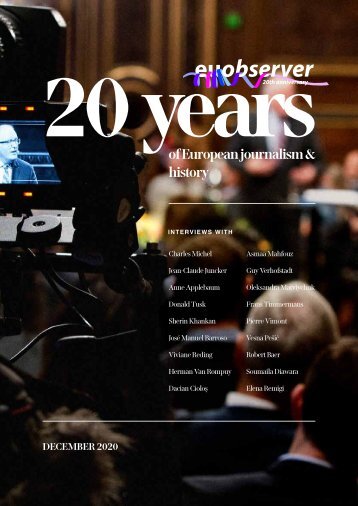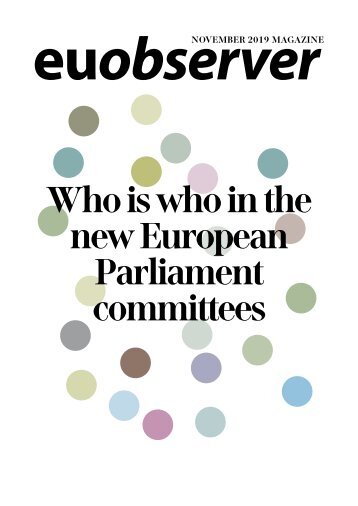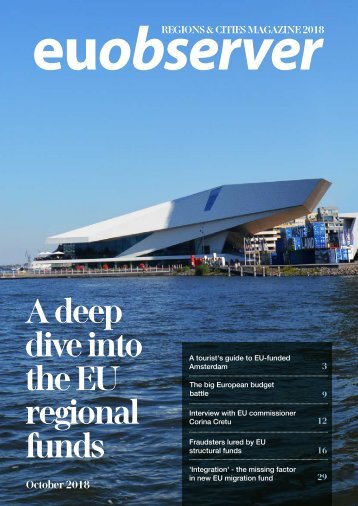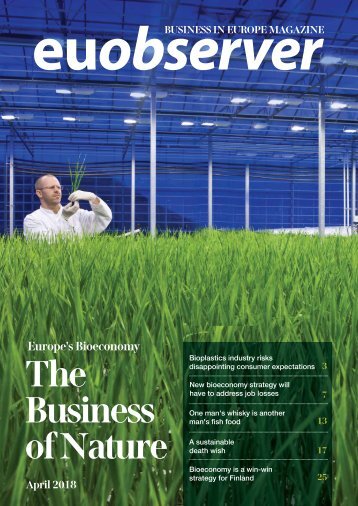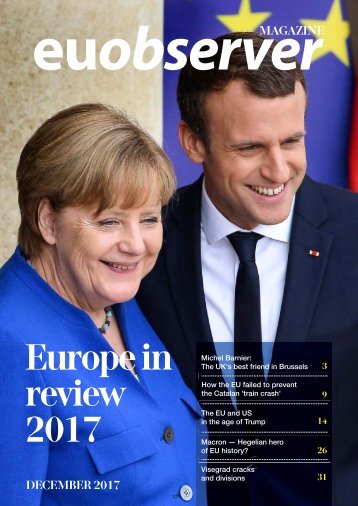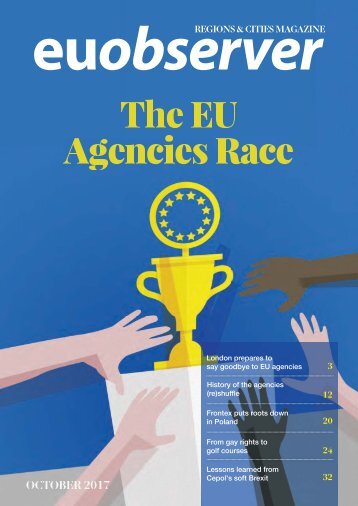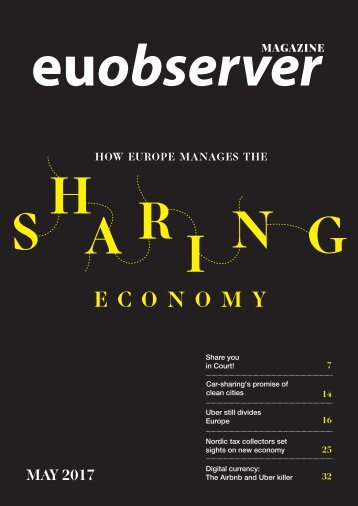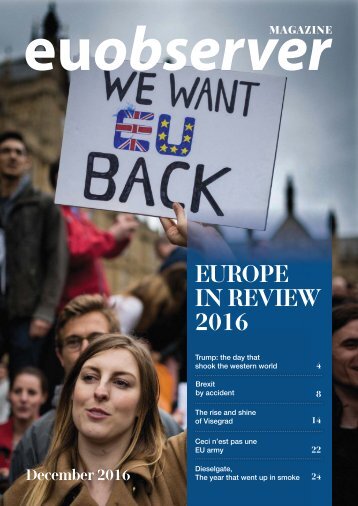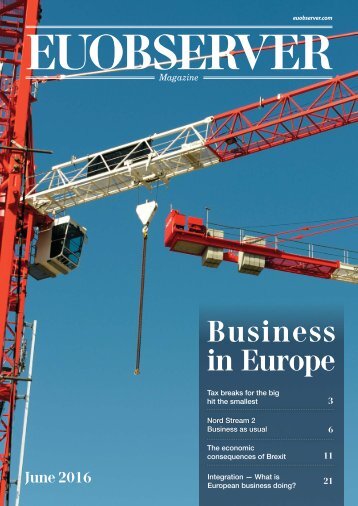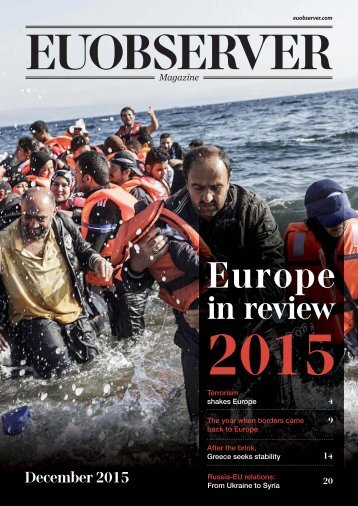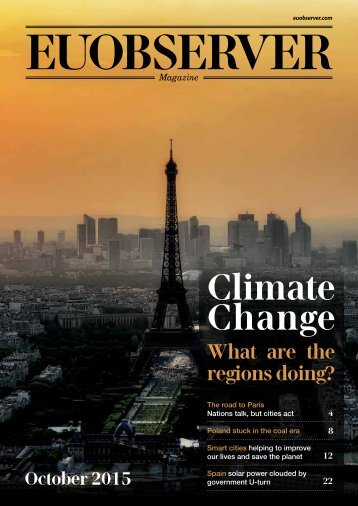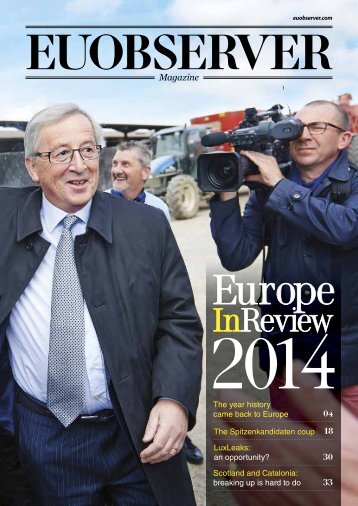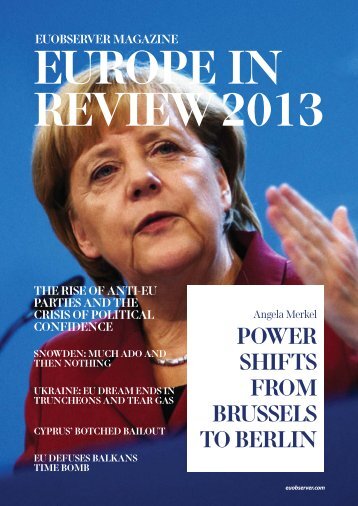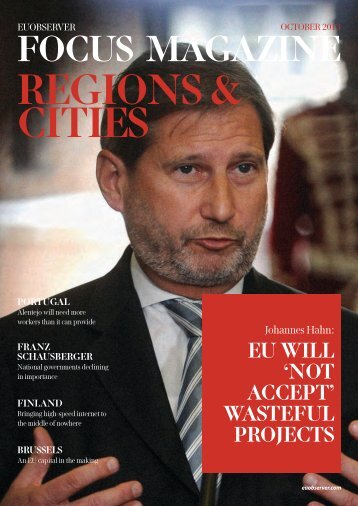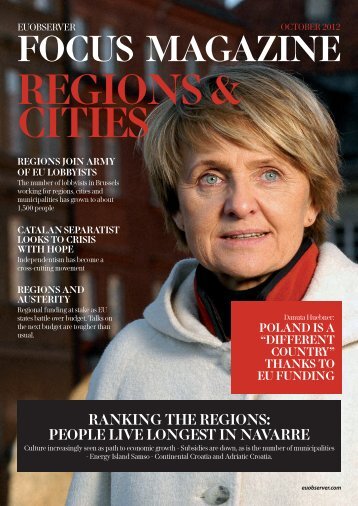Europe in Review 2014
- Text
- Terrorism
- Cameron
- Farage
- Ttip
- Romania
- Economy
- Ukraine
- Ukraine
- Catalonia
- Scotland
- Luxleaks
- Spitzenkandidaten
- European
- Juncker
- Parliament
- Euobserver
- Russia
- Brussels
- Democracy
- Elections
Artur Mas is the
Artur Mas is the president of Catalonia, Spain’s most wealthy region. Photo: Convergència Democràtica de Catalunya Tony Blair’s Labour government introduced devolution for Scotland and Wales more than 15 years ago in part to kill off future demands for independence. Despite being in government in Edinburgh since 2007, the Scottish Nationalists were still 20 points behind the No campaign at the start of 2014. The Scottish campaign was never supposed to be so close. SCOTLAND’S EU STATUS EU membership was one of the main bones of contention. The pro-Union Better Together campaign argued that an independent Scotland would be booted out of the bloc and be forced into a lengthy and uncertain accession procedure. The Yes campaign claimed that a simple revision of the EU treaty could protect Scotland’s EU status without accession negotiations. Pro-Independence campaigners also retorted that Cameron’s plan to hold an in/out referendum on the UK’s continued membership in 2017 was a more serious threat to Scotland’s EU status. Just as serious was the debate about whether an independent Scotland would be able to continue to use the pound or be forced into the eurozone, an issue on which the Yes campaign failed to offer a clear answer. RELIEF IN BRUSSELS In Brussels, meanwhile, although the European Commission studiously avoided taking sides, the relief in the EU executive’s Berlaymont headquarters was almost as palpable as in London. Scottish independence would have caused a major headache for the EU institutions and sent a shock-wave across the bloc. There is no precedent for an EU country breaking up. Carefully constructed compromises on voting weights in the Council - where member states are represented MEP seats would have had to be unpicked and re-written, not to mention a potentially fraught accession process for a Scottish bid to join the EU. It would also have provided a huge fillip for nationalist and regional parties that have seen a surge in support across a number of EU countries. CATALONIA Two months later, and a few thousand kilometres south of Edinburgh, voters in Catalonia had their own independence poll. Catalonia’s vote lacked similar drama for the simple reason that it was not going to change anything. Spain’s centre-right government and the opposition socialist party were united in their opposition to the poll, while the country’s constitutional court forbade the holding of a formal referendum. The court even sought to halt the consultative referendum pending an analysis on whether it breached the Spanish constitution - a position which was ignored by the Catalan government. Perhaps unsurprisingly, most Catalans chose not to vote. Only one in three Catalans went to the polls on 9 November, although around 80 percent of those who did voted Yes to the two questions: “Do you want Catalonia to be a state? If so, do you want this state to be independent?”. Ten percent backed a Catalonian state that remained part of Spain while 4.5 percent voted No on both questions. In both cases the referendum result is not the final word in the story. KINGMAKERS As the opinion polls narrowed, pro-Union politicians offered new powers to the Scottish government, including more powers over taxation and economic policy, in a bid to keep Scotland in the UK. These will now have to be fleshed out. Cameron’s Conservative party only holds one of the 59 MPs elected to Scottish constituencies, and his English-centric party will be resistant to any extra financial support to Scotland. He has also vowed to tackle the constitutional quirk which allows Scottish and Welsh MPs to vote on policy matters that affect England but not vice versa. Scots voted ‘No’ in their referendum in September but talk about further devolution will continue. Photo: Phyllis Buchanan Nor does the referendum defeat appeared to have dampened the enthusiasm of Scots for either the SNP or independence. A survey conducted in early November indicated that 52 percent of Scots now back independence. Polls also suggest that the SNP will gain a bushel of seats from the Labour and Liberal Democrat parties and could, potentially, end up as kingmakers following next May’s general election. If Scottish independence is on the back-burner for now, it would be naive to rule out the prospect of another referendum within the next decade. ARTUR MAS The situation is more turbulent in Spain, where Catalan government leader Artur Mas is set to face federal charges for disobeying the court order and misusing public money by holding the referendum. Prime minister Mariano Rajoy has also stated that there is no chance of a formal referendum on secession, describing the November poll as “not a consultation or a democratic vote but rather an act of political propaganda”. However, the overwhelming Yes among those who voted is likely to stiffen the resolve of Mas and his supporters to demand a binding referendum in the future. Independence campaigners have been silenced, but probably not for long. • The November poll in Catalonia was not binding - the independence question remains uncertain. Photo: sba73 34 ––––– Europe in review 2014 Europe in review 2014 ––––– 35
- Page 1 and 2: euobserver.com Magazine Europe 2014
- Page 4: The year history came back to Europ
- Page 8: Dear Mr. Juncker, We need to talk
- Page 12: THE EU SEMESTER ALLIANCE, A KEY VOI
- Page 16: war between two groups of Ukrainian
- Page 20: Photo: European Commission Jean-Cla
- Page 24: THE GENDER BALANCE Another issue th
- Page 28: TTIP’S Teflon coat wears thin The
- Page 32: PHOTOSSERIES Liberal leader Guy Ver
- Page 38: OVER the BLUE HORIZON A killing in
Inappropriate
Loading...
Mail this publication
Loading...
Embed
Loading...

